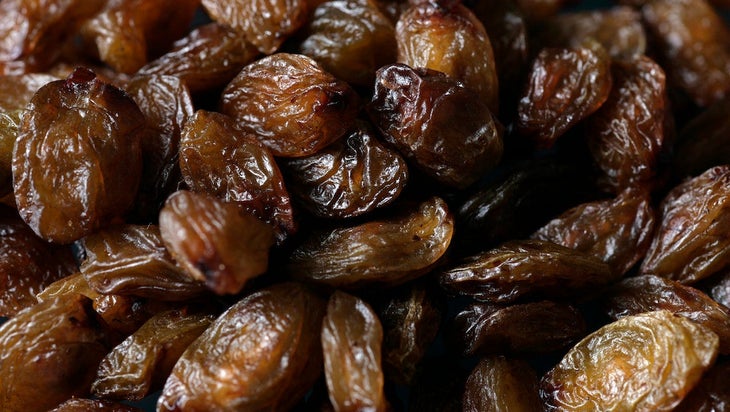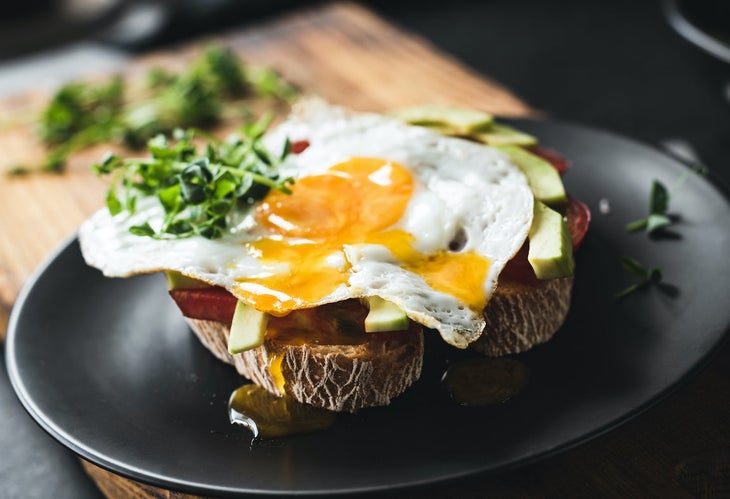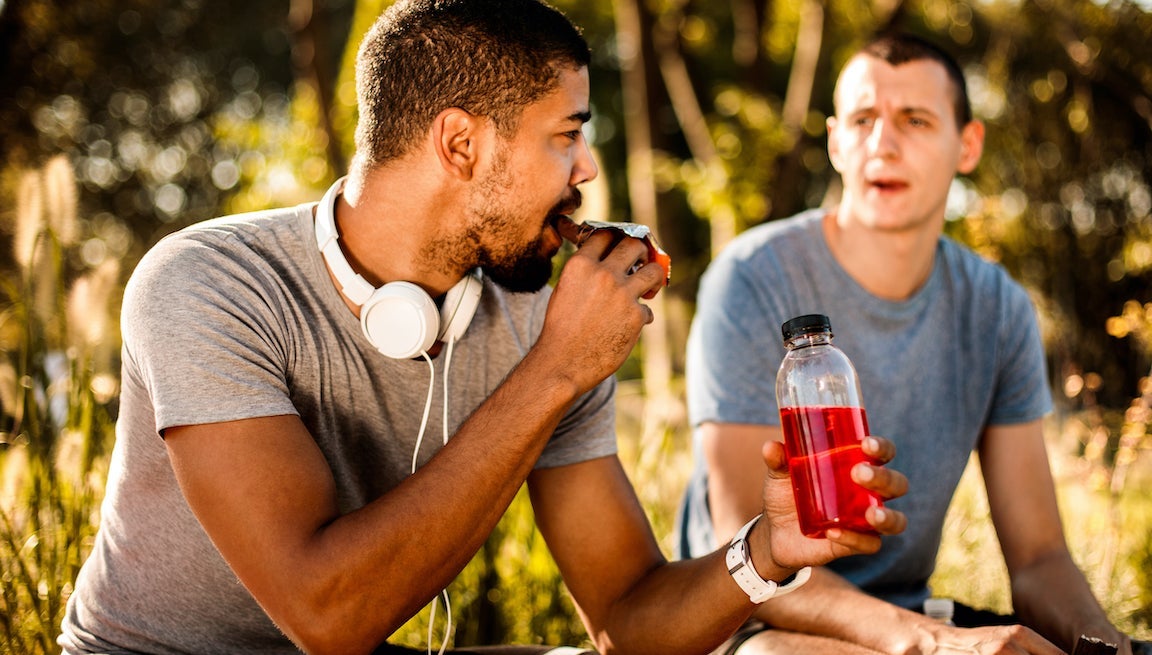Love them or hate them, hot and humid summer runs are the foundation of fall marathon training. You love going long, but the conditions can turn them into sweaty tests of endurance. Knowing how to eat for summer marathon training runs can go a long way toward making them more effective and enjoyable.
Eating Enough as a Runner
Thinking about nutrition for summer marathon training runs, it can be hard to know where to start, because thinking about diet as a whole can feel quite overwhelming. One of the first things I tell my clients is that marathon training is absolutely not the time to cut calories or manipulate weight, as being in a constant calorie deficit can impact injury risk, recovery, glycogen stores and more. The core principles of marathon training are predicated on an adequately fueled body.
If we think about sports nutrition as a pyramid, eating enough is at the base. Making sure you’re getting enough calories and energy is paramount. From there, we can start to tweak macronutrient distribution, making sure you’re getting adequate micronutrients and adding in supplements, when and if necessary. But, the foundation is cemented by our daily diet and in eating enough to support the large amounts of energy required.
Let’s talk about each part of the run and your nutritional needs during each stage.
What to Eat Before a Run
Your run begins before you take your first step. It starts with what you’re eating and drinking in the period leading up to your run. The purpose of a pre-run snack or meal is to top off your glycogen (stored carbohydrate) stores to power through your run. Carbohydrates are the most readily available source of fuel for our muscles so keeping them continually stocked will only benefit you.
If you’re eating an hour before a run, aim for 1 gram of carbohydrate per kg of body weight. So, for example, a 150 lb. (68 kg) athlete would aim to eat between 60–70 grams of carbohydrates before exercise. Two hours before exercise, eat up to 2 grams of carbohydrate per kg of body weight, upping that a gram for every hour: 3 grams per kg of body weight 3 hours before exercise, and 4 grams per kg of body weight 4 hours pre-run.
For reference, a medium to large banana is about 25-30 grams of carbohydrates, a cup of juice is 30 grams, and one piece of toast is about 15 grams. If you have a sensitive stomach, limiting fat and fiber hours before a run may be helpful.
And, for summer runs, staying adequately hydrated is extra important! Before exercise, drink 5-10 mL/kg at least 2–4 hours before exercise (thus a 175-pound (80kg) man needs 400-800 mL or 14-28 ounces). You can also top off with 8–10 oz 10–20 minutes before.
What to Eat While Running
Assuming you’ve eaten an adequate pre-run snack or meal and your diet is nutritionally sound, most people can run anything under an hour without requiring additional fuel.
However, once your runs get to 60-70 minutes and above, fueling during your run provides several benefits for your performance. Aim for 30-60 grams of carbohydrates per hour, which can come from liquid nutrition, gels, chews, real food, or a mixture.
Allow yourself ample time before race day to test what works for you. You’re probably going to need to drink water with most products you use, so plan accordingly.
Speaking of water, it’s something you need to prioritize during exercise as well. Aim to replace sweat losses, but do not exceed them. A good starting point is 0.4-0.8L/hour, but will depend on your sweat rate. The goal during exercise is to prevent excessive dehydration of over a 2% loss in body weight.
Longer runs will also require sodium, which fortunately is found in many sports nutrition products, some more heavily concentrated than others. A good starting point is 200-500 mg of sodium per hour, but that may need to be increased depending on your personal needs. Those who are heavy or salty sweaters, or runners who eat very few processed foods or added salt in their diets, may need higher amounts of salt. We all have different individual sweat rates, so having a sweat test done is a great way to estimate the amount of salt in your sweat.

What to Eat After a Run
While you may feel the need to dash right into the shower after a run (especially in this summer heat and humidity), do not skip the refueling part. Consider your post-run snack a necessary part of your cool down. While the window of opportunity for refueling is longer than we once thought (30 minutes), the sooner you can start the refueling process, the sooner you can switch your body from a state of catabolism to anabolism and start the recovery process. Therefore, getting a meal or snack in sooner rather than later (within two hours, ideally) can help your recovery. If you have a second workout planned, it requires faster post-workout fueling, within 30 minutes to an hour, to help muscles recover and prepare them for future activity.
Ideally, aim for a carbohydrate- and protein-rich snack. Any sort of workout puts us in a catabolic state—breaking down fat and muscle for energy—so a snack first and foremost further prevents the body from breaking down, and instead, starts the anabolic muscle-building, process. Carbohydrates can also help to refuel glycogen stores for future runs and workouts, while helping to increase and balance blood sugar. Carbohydrates also aid in (re)hydration.
Aim for a 3:1 to 4:1 ratio of carbohydrates to protein. In simpler terms, make half of your plate carbohydrates (about 50-60 grams) and aim for 20-30 grams of protein, including essential amino acids, such as leucine. Some easy ideas include a smoothie (with a carbohydrate source on the side if necessary), Greek yogurt with fruit, cereal or granola, a sandwich, pasta with protein and vegetables, or eggs and toast.
Don’t forget to rehydrate and include sodium-rich foods or products to help with rehydration, especially when large sweat losses have occurred.

How to Properly Hydrate for a Run
It should go without saying that hydration is important to prioritize every day, not just around a run. If you go into a run in a dehydrated state, it’s almost impossible to “play catch up.” Proper hydration includes a balance of water and electrolytes, namely sodium. Sodium will help the body retain more water and reduce the risk of hyponatremia and severe muscle cramps during exercise.
While individual hydration needs depend on body composition and size, age, physical activity and training levels, weather, and lifestyle, aiming for at least half of your weight in body ounces is a great place to start.
Remember that water, fruit juices, sports drinks, coffee, teas, fruits, vegetables, and soups all count towards fluid intake.
Should You Be Running on a Low Carb Diet?
If you’re looking to grab a personal best or improve your marathon time and performance, carbohydrates are your friend and a low-carbohydrate diet may not meet your needs. Carbohydrates are the fastest source of fuel for exercise, and having low glycogen stores will make energy production process less efficient; increase the rate of injury and low blood sugar; and decrease the body’s ability to oxidize carbohydrates during training.
Try a Healthy Late-Night Snack
If you’re on the fence about whether to add a nighttime snack into your routine, it may be worth trialing. Snacking after dinner does not necessarily lead to weight gain and it may greatly affect your workouts and recovery for the better.
For one, a nighttime snack allows another opportunity to get more nutrients into your diet, as marathon training greatly increases the body’s needs of nearly every nutrient. If you’re not meeting your protein needs (generally estimated to be 1.2-1.4 g/kg of body weight), taking advantage of another feeding opportunity is a prudent practice. Secondly, it can help balance blood sugar overnight and top off glycogen stores before an early workout the following morning.
Additionally, some research has suggested that high protein snacks help with muscle growth and overnight recovery.
There is certainly a lot to consider for marathon nutrition needs, so start slow and practice, practice, practice. Trial and error is often the way you’ll find out what specific fueling tactics work for you as an individual, but these are some guidelines to follow.
If you’re seeking more individualized advice about these topics, it’s important to see a Registered Dietitian who can craft a personalized plan for you and your needs.
About the Author
Sarah Schlichter, MPH, RDN, is a registered dietitian based in the Washington, DC area. She helps to fuel runners without strict dieting. Sarah is also a nutrition consultant and writes the blog, Bucket List Tummy, sharing nutrition posts, healthy family-friendly recipes and running tips. Additionally, Sarah co-hosts the Nail Your Nutrition Podcast, focused around evidenced-based nutrition tips for athletes. Learn more about Sarah and her work at her website, Nutrition for Running.


